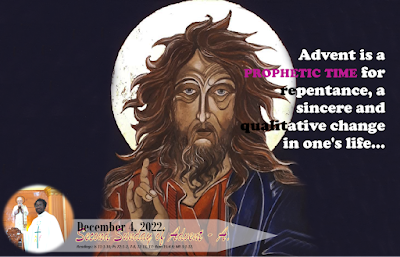DO GOOD, AVOID EVIL.
August 29, 2021
Twenty-second Sunday in Ordinary Time – B.
A Romanian proverb says: “The law grows of sin, and
chastises it.” And a Russian proverb adds: “There is no law written for fools.”
The primary aim of every law and regulation is human life.
To live however means to do what is good and avoid what is evil. In this sense,
any social or legal regulation that does not find its primary end in our
well-being is not only inhumane but is a bad law.
The purpose of our life, not only as Christians, but also
and before all as humans, can be summarized in this our opening prayer: to love
the name of God, the giver of all that is good, to deepen our sense of
reverence, and to nurture and keep in our heart what is good. That is the real
vocation of man. Sadly, we lose sight of that vocation when we give way to
evil.
In today's first reading, Moses exhorts the children of
Israel to the observance of the Law of God. From Moses' words, we learn that
all the laws and customs were given by God to his people so that they may live.
The law is for human life, we said. Any human society or association needs
rules and regulations. Without them, we fall into what the philosophers call
the "state of nature", a state without rules where the rule of one
imposes itself to that of the other.
Israel, after they departed from Egypt, was getting
organized little by little as a community and nation. They could never be a
great nation without a fundamental law. The ten commandments thus, stand as the
fundamental law of the people of God. Let us just see our nations today as that
of Israel. Which position holds our constitutions and how do we refer to them?
Can there be a strong nation without people obeying their constitutions?
In the state of nature, mankind is not a living but a
surviving. All he does is save his life. The Divine Law, as given through Moses
to the people was for their good and harmonious life as a nation. Israel,
nevertheless, forgot one invective of the Law, they were to add nothing to it
but only obey it. It is the interpretations and manipulations of the Law that
denature it. Every law loses its essence when it is manipulated. What was aimed
for the good became an enslaving object for its subjects because of the
encumbrances of tradition.
Jesus in the Gospel makes a strong invective to the Scribes
and the Pharisees about their interpretation of the law of purity. As we read,
the Pharisees were scrupulous observers of external purity. Nonetheless, they
forgot the main essence of that Law of purity, the internal, the seat of the
genuine relationship with God and others. Jesus accuses them of hypocrisy. They
"disregard God's commandment but cling to human tradition." What God
expects of us is not our scrupulous attachment to rules, but a greater concern
for what is good, that is, to avoid all kinds of evil from within: unchastity,
theft, murder, adultery, greed, malice, deceit, licentiousness, envy,
blasphemy, arrogance, folly. All that comes from our hearts and defiles us.





Comments
Post a Comment